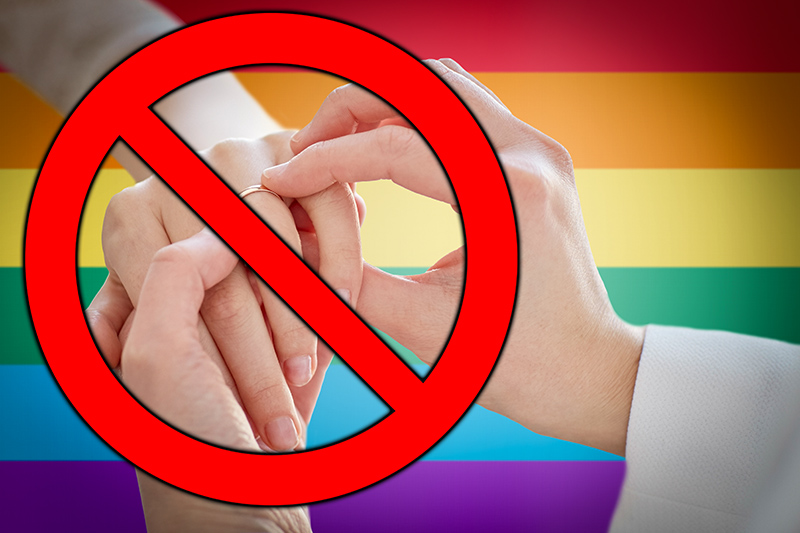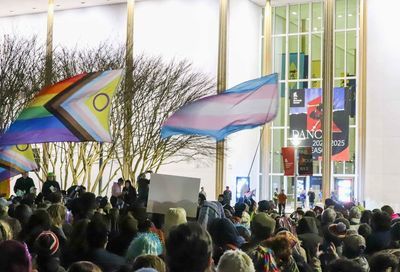U.S. House Approves Final Version of Respect for Marriage Act
Congressional lawmakers approved a bill to recognize legal same-sex marriages as valid, sending it to President Biden to sign into law.

On Thursday, the U.S. House of Representatives passed the Senate-approved version of the Respect for Marriage Act, containing additional protections for religious liberty, by a bipartisan vote of 258-169-1.
Thirty-nine Republicans voted in favor of the bill, a decrease of eight from an earlier version that passed the House in July, which garnered the support of 47 Republicans.
Four other Republicans did not vote on the measure, and one Republican voted “present.” All 219 members of the Democratic caucus voted in support of the Senate version of the bill, which now heads to President Joe Biden’s desk for his signature into law.
The bill, as amended, codifies the U.S. Supreme Court’s 2013 ruling in U.S. v. Windsor, requiring the federal government and individual states to recognize the validity of any same-sex marriages — and interracial marriages — legally performed in states without prohibitions on the practice, regardless of whether the state recognizing the marriage has laws or constitutional amendments banning same-sex nuptials.
The bill adds multiple protections for religious liberty, clarifying that churches are not required to perform same-sex marriages, exempting nonprofit religious organizations from having to provide services, facilities, or goods for a same-sex marriage ceremony, and protecting opponents of same-sex marriage from being penalized or losing special accreditations or tax breaks.
The bill also maintains an existing federal ban on polygamous marriages.
The Senate had added those protections last week in order to gain the support of at least 10 Senate Republicans, in order to overcome the threat of a filibuster. Ultimately, the revised legislation passed the upper chamber, earning the support of 12 Republican senators and the entirety of the Democratic Senate caucus.
The push for the Respect for Marriage Act gained steam following the Supreme Court’s decision earlier this year overturning the 1973 landmark abortion case Roe v. Wade, which had guaranteed a federal “right” to obtain an abortion, and returning the issue back to individual states to decide whether to allow abortions, and, if so, how to regulate them.
In a concurring opinion, Associate Justice Clarence Thomas opined that the high court should go further, overturning all past court opinions involving unenumerated rights, or those not explicitly mentioned in the constitution — including the 2015 Obergefell case striking down state bans on same-sex marriage, as well as the 2013 Windsor case, which required the federal government to recognize same-sex marriages from states where the practice is legal, and the 2003 Lawrence v. Texas case, which struck down state anti-sodomy laws as unconstitutional.
As such, supporters of same-sex marriage argued that they could no longer trust the courts — especially those overseen by conservative judges — not to reverse progress. Proponents ultimately settled on a strategy to pass a law requiring same-sex marriages to be recognized and the members of those unions granted the same rights and benefits as members of opposite-sex marriages — which would continue to remain in place even if the Supreme Court were to reverse its past precedents.
U.S. Reps. Mark Takano (D-Calif.) and David Cicilline (D-R.I.), the co-chairs of Equality PAC, the political arm of the Congressional LGBTQ Equality Caucus, celebrated the vote as significant, even as they called for Congress to take further steps to prohibit anti-LGBTQ discrimination by passing the Equality Act.
“Through this historic vote, Congress has affirmed the right to marry for gay and interracial couples,” the congressmen said in a joint statement. “We want to thank every member of Congress, in the House and Senate, that voted for this commonsense legislation that gives security to millions of families across the nation. Respect for marriages is a family value which should never be threatened.”
Dr. David Johns, the executive director of the National Black Justice Coalition, praised Congress for passing the bill, which repeals the Defense of Marriage Act, the Clinton-era law denying federal recognition of same-sex relationships.
“In this democracy, the people have already determined we can all marry the person we love and have our marriage recognized and protected where we live,” Johns said in a statement. “Passing this Act is a necessary step given impending threats by a Supreme Court attempting to weaken democracy by codifying decisions that should be the responsibility of elected leaders and should not stand in the place of necessary efforts to codify the Equality Act to ensure clear and consistent nondiscrimination protections. There remains work to be done.”
Sarah Kate Ellis, the president and CEO of LGBTQ media advocacy organization GLAAD, echoed that sentiment.
“Passage of the Respect for Marriage Act today is a victory for LGBTQ couples and couples of different races, and a bipartisan recognition that our families are accepted, supported and worthy of the same protections as any other,” Ellis said.
“This legislation will safeguard much-needed protections for millions of couples who are baselessly vulnerable in today’s hostile political climate at the state level and in the courts,” she added. “It’s long past time for politicians to catch up to the supermajority of Americans of every party who support shared values of equal treatment, and our right to be free from discrimination and to have the same chances to belong, contribute and succeed in our communities and in our country.”
Support Metro Weekly’s Journalism
These are challenging times for news organizations. And yet it’s crucial we stay active and provide vital resources and information to both our local readers and the world. So won’t you please take a moment and consider supporting Metro Weekly with a membership? For as little as $5 a month, you can help ensure Metro Weekly magazine and MetroWeekly.com remain free, viable resources as we provide the best, most diverse, culturally-resonant LGBTQ coverage in both the D.C. region and around the world. Memberships come with exclusive perks and discounts, your own personal digital delivery of each week’s magazine (and an archive), access to our Member's Lounge when it launches this fall, and exclusive members-only items like Metro Weekly Membership Mugs and Tote Bags! Check out all our membership levels here and please join us today!
























You must be logged in to post a comment.